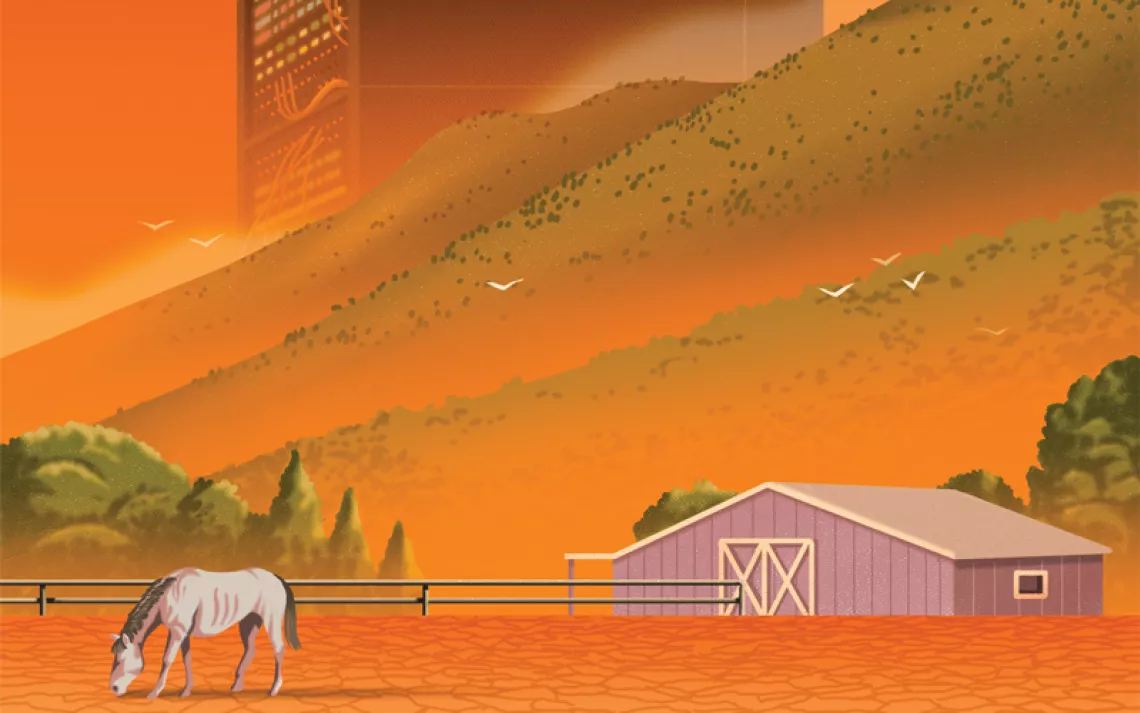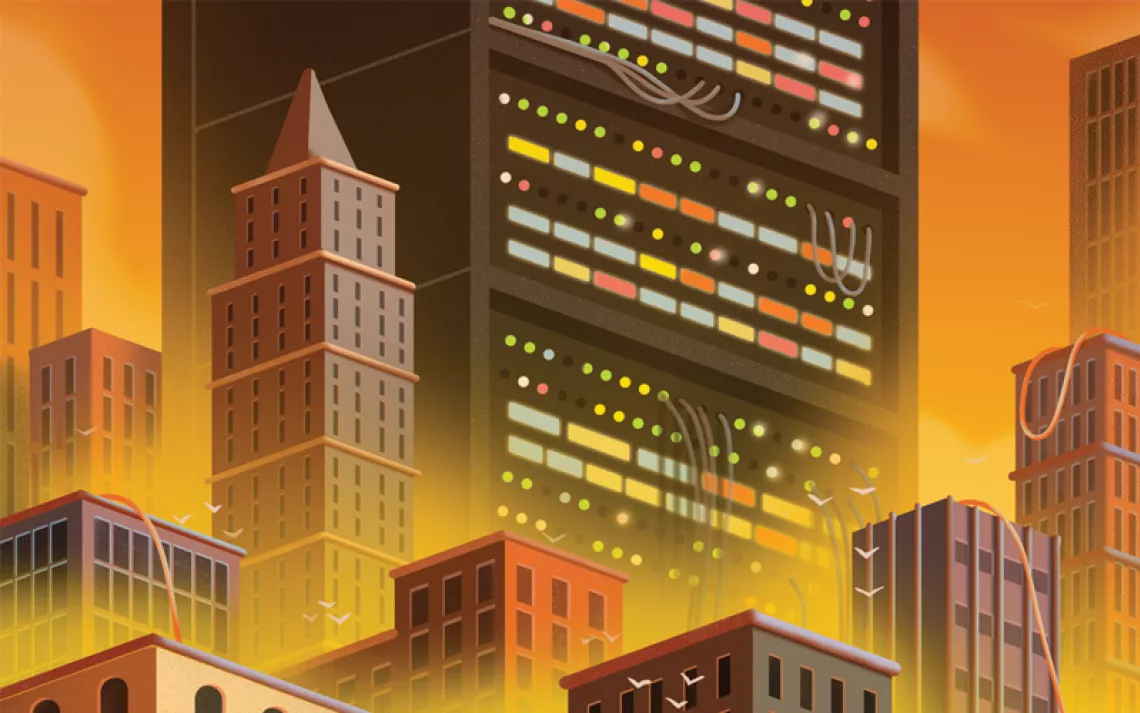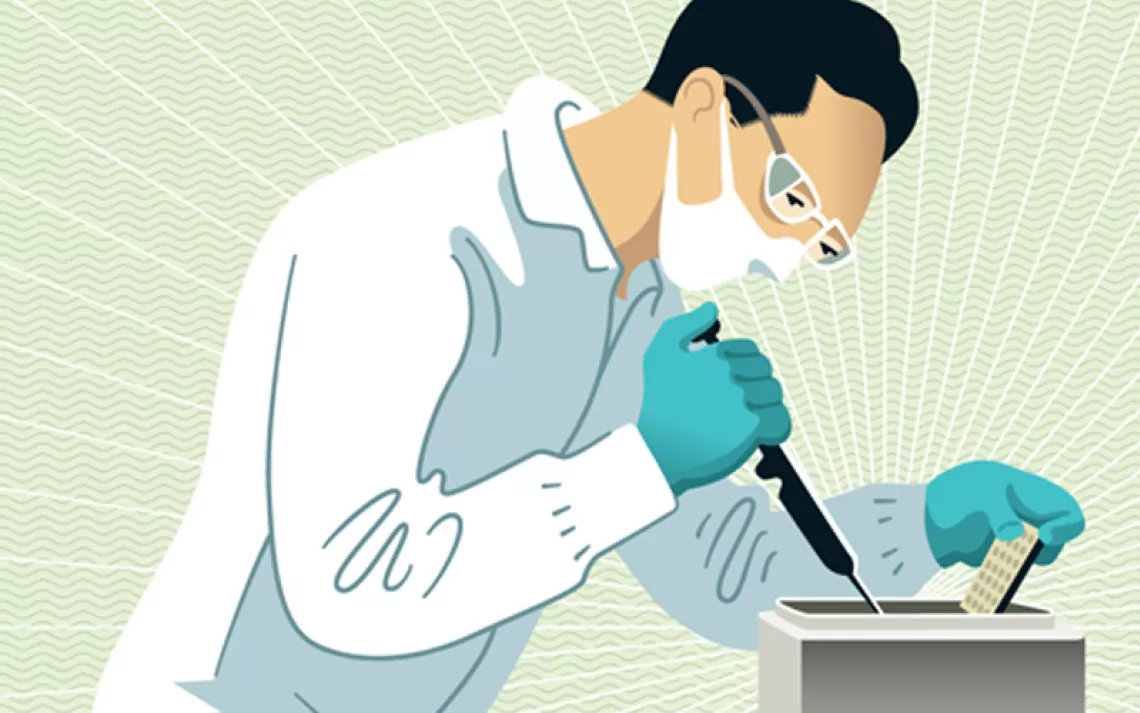Leigh Ann Henion Goes Paleo-Tech at the country's largest primitive skills gathering
The author of Phenomenal learns to throw with an atlatl and remembers that she can choose or refuse technology's tools

Illustration by Joe Anderson
Jason Drevenak pulls deer sinew from a jar and angles it into his mouth like a piece of spaghetti. He's wearing uneven buckskin clothing and smells of wood smoke. I'm at the Firefly Gathering, the largest primitive-skills event in the country, sitting in a southern Appalachian meadow watching Jason craft an arrow out of native river cane.
The sinew needs to be supple. "Chew on it for a few minutes," he instructs. "The saliva reconstitutes its adhesive qualities." When it reaches the consistency of overcooked pasta, it's ready to wind around a stone arrowhead.
"When you're done with the sinew, we're going to the next evolution," Jason says. He fumbles through a bark basket and pulls out a collection of turkey feathers intended to stabilize the arrow in flight. Then, he offers me something I never expected to see here: a tube of superglue.
I came to Firefly to escape the ever-present glow of screens, to use my hands to carve wooden bowls and weave pine-needle baskets. Now I'm beginning to get that Firefly isn't about renouncing modern technology but about appreciating technology's origins.
Roughly an hour and forty thousand years before the arrow-making workshop, I was part of a group learning how to throw darts with an atlatl, a small piece of wood that hurls projectiles up to seven feet long. The darts are made out of river cane and look like gigantic arrows, complete with feathers. Ancient precursors to the bow and arrow, atlatls are thought to be one of the first compound tools that harnessed human energy to propel something farther, faster. Today, only a few people know how to use these objects.
Luke McLaughlin is one of them. "The atlatl's just a stick, really," he said, standing on a hill overlooking Firefly's circus-style tents. Antler spurs affixed to the small, handheld pieces of wood hold the enormous darts in place and provide leverage.
Trying to use an atlatl is like playing a game of bar darts with beach umbrellas. "This is in your DNA," Luke said, "but you haven't practiced for a few thousand years!"
I improved with each toss until, finally, I figured out a wrist flick that helped my darts go beyond what I'd imagined possible. Luke had explained the technique, but I didn't understand what he meant until I felt river cane soar off the atlatl and into high grass.
When I headed downhill to learn how to build arrows, Luke went on to teach a workshop on how to make a bow drill, an ancient tool that creates fire with wood-on-wood friction.
"Nothing in nature is inherently good or bad," he said as we parted. "The question is, how do we harness its usefulness without harming ourselves?"
At the arrow-making class, Jason pops the lid off his superglue bottle and passes it around. He typically uses hide glue, a gelatinous leftover from the process of tanning animal skin. But producing it requires hours he doesn't have today and a string of oft-harrowing tasks, beginning with killing an animal, so superglue it is.
Look far enough into the lineage of most modern tools and you'll find an alternative that requires less mutation of nature's elements—albeit one that requires dedication, time, and know-how: Gun, bow, or atlatl? Lighter, match, or bow drill? Superglue or hide glue?
Today's tactile lessons have reminded me that I have the power to choose or refuse the tools I'm offered on a daily basis. I don't have to transition to a buckskin wardrobe to make meaningful changes.
Tomorrow morning, I will boil water for tea instead of continuing my harried habit of putting a mug in the microwave. I'll handwrite, in pen, a letter to a friend. I'll be more intentional about how I use technology in my daily life, weighing the costs and benefits rather than just accepting it for its convenience factor. Every day presents new opportunities to pull from the long arc of history.
When I wince at the glue's noxious fumes, Jason nods. "This is fast, easy, and effective, but it's not my preference," he says. "Come spend a few more days with me . . . and we'll do it another way."
This article appeared in the January/February 2017 edition with the headline "Paleo-Tech."
 The Magazine of The Sierra Club
The Magazine of The Sierra Club



